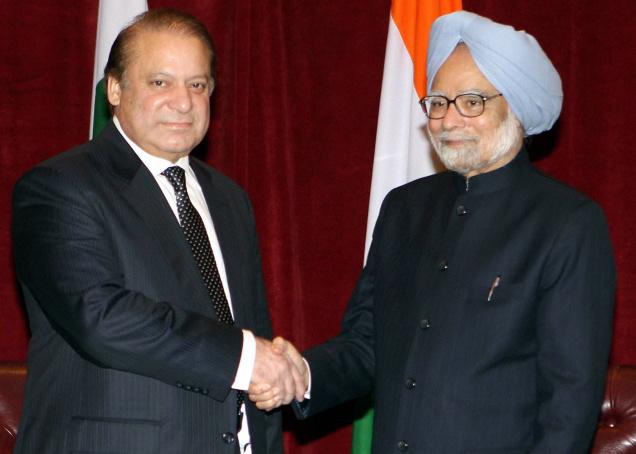Reducing tensions along border key to better India-Pak ties
New York, September 29: With a spate of violent incidents threatening to upend the decade-long ceasefire between India and Pakistan along the Line of Control, the Prime Ministers of the two countries have decided to task their respective Directors General of Military Operations with suggesting “effective means to restore the ceasefire and a way forward to ensure that that remains in force and in place.”
The outcome of the meeting, which had been in the works for several weeks, is surely a modest one. But Indian officials said it was also realistic, noting that the increasingly brittle situation on the LoC had become a source of enormous concern.
In separate briefings held soon after an hour-long meeting between Manmohan Singh and Nawaz Sharif here on Sunday, India’s National Security Adviser, Shivshankar Menon and Pakistani foreign secretary Jalil Abbas Jilani said both leaders agreed that improving the situation on the LoC — which has seen repeated violations in recent months – is a precondition for the bilateral relationship to move forward.
“They decided to ask the DGMOs to suggest effective means to restore the cease-fire and ensure it remains in force and in place,” Mr. Menon said. Though no time frame had been set, the hope is that this happens as soon as possible. Mr. Jilani added that the DGMOs had also been asked to investigate all incidents along the LoC and ensure there was no recurrence.
Speaking on background, a senior Indian official told The Hindu that the proposal to have the DGMOs sort out violations of LoC came about after India rejected several ideas floated by the Pakistani side, including one to have the two foreign secretaries meet and another involving “neutral” monitoring by a third party such as the UN.
Mr. Menon said that Prime Minister Manmohan Singh raised the issue of terrorism and the need for Pakistan to take effective action against the perpetrators of the 26/11 Mumbai attacks. “Mr. Nawaz Sharif said that was Pakistan’s intention” and now that the Judicial Commission had returned from India after gathering evidence “there would be further progress,” the NSA’s readout of the discussions noted.
Other issues also arose, such as trade, Siachen and Sir Creek. But both leaders agreed that progress would be possible only if the immediate problem along the LoC was sorted out. Asked about Balochistan, Mr. Menon acknowledged Mr. Sharif raised the issue. “Our Prime Minister made it clear there is no question of Indian involvement,” he said, adding that “if there was evidence, we would be happy to review it.”
Dr. Singh raised the specific issue of the Punjab provincial government in Pakistan — that is ruled by Mr. Sharif’s Pakistan Muslim League (N) — providing financial support to the Jamaat-ud-Dawa, the successor organisation of the Lashkar-e-Taiba, Mr Menon said. But Mr. Sharif stuck to the official Pakistani line that these funds were only being used to provide educational and welfare activities.
Both officials were careful to sidestep media questions that sought to portray the meeting in negative light. “There is no such thing as an awkward question, but there are awkward answers and I am not going to give you one,” Mr. Menon said when asked whether India felt Mr. Sharif’s writ ran over the Pakistani army. “We are dealing with Pakistan.” “One should never underestimate the importance of high-level interaction,” Mr. Jilani insisted. “They always produce a positive outcome.”

